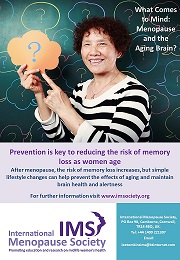To celebrate World Menopause Day on 18th October 2015, IMS launched a new campaign with the theme “What comes to mind – menopause and the aging brain”.
After menopause, the risk of memory loss increases, but simple lifestyle changes can help prevent the effects of aging and maintain brain health and alertness.
Lead author Professor Victor Henderson commented:
“Each of us is responsible for our own health, and many aspects of healthy aging are under our direct control. These include, for example, smoking cessation and regular exercise. Concerns with memory and cognitive abilities are increasingly common in midlife and older adulthood. For cognitive aging, advice abounds, but it is less certain what the individual can do to maintain or improve her mental abilities. The White Paper and the accompanying materials highlight a number of health and lifestyle factors that are thought to contribute to cognitive decline associated with age. The White Paper sought evidence on 12 individually modifiable interventions with the potential to ameliorate cognitive aging. Whilst most individually modifiable risk factors have not yet been adequately studied, results suggested that the Mediterranean diet supplemented by olive oil and tai chi exercise may improve global cognition, and the Mediterranean diet plus olive oil and soy isoflavone supplements may improve memory. Cognitive training and other forms of mental activity may have cognitive benefit as well. We conclude that some interventions that can be self-initiated by healthy midlife and older adults may reduce the impact of cognitive aging.”
An educational toolkit of materials has been developed to support local country initiatives throughout the month of October to raise awareness of this potential health issue and many have been translated into key languages to ensure the campaign has a truly international perspective.
A White Paper – Individually modifiable risk factors to ameliorate cognitive aging
The International Menopause Society undertook a systematic review and meta-analysis to identify the individually modifiable risk factors to ameliorate cognitive ageing. The review is available for download on the Taylor & Francis website and was published in the hard copy of our peer-reviewed journal, Climacteric, in October 2015.

Reprints
The IMS grants permission to individuals only to reproduce the copies of the review for their own personal use but requests that organisations contact Ms Lee Tomkins, IMS Executive Director for advice on how to order reprints.
Awareness Raising Poster – What comes to mind: menopause and the aging brain
This A4 poster is designed to disseminate the message that prevention is key to reducing memory loss as women age.


The poster can be used in a physician’s waiting room or reception, in libraries, or during health awareness meetings for women. The poster can be used throughout the year to encourage women to seek help and advice from their health care professional. It is available in the following languages:
Reports on World Menopause Day from around the world
INDIA
Click below for a full report from the many chapters of the Indian Menopause Society that took part in WMD 2015.
Patient Information Leaflet – What comes to mind: menopause and the aging brain
This is a comprehensive booklet which reviews the risk of memory loss after the menopause and explores simple lifestyle changes that can help to prevent the effects of ageing and maintain brain health and alertness.


Reports on World Menopause Day from around the world
BANGLADESH
I am writing the report on how Bangladesh menopause society celebrated the WMM. We organised a day long, scientific seminar on 20th October where different aspects of menopause were discussed and the theme of the WMM “brain aging” was highlighted. The recent update of the IMS recommendations was dessiminated by the CAMS representative. We have translated the posters and the white paper into Bangla which were distributed throughout the country. We organized an awareness program, free health check ups, distribution of Medicine and clothes among the women in different areas during the month. We had a talk show on Television, a feature in a news paper regarding the menopause.
We arranged panel discussions and oral presentations at SAFOMS during the 24th biennual international conference which was held in Bangladesh on 26 & 27th November. Also we presentend sexual aspect of menopause in the 2nd Biennual international conference SASSM (South Asian Society for Sexuality Medicine) on 5 & 6th December, held in Dhaka.
We like to work more to improve the quality of life of menopause under the guidance of IMS.
Best regards.
Prof Zinnat ara Nasreen



